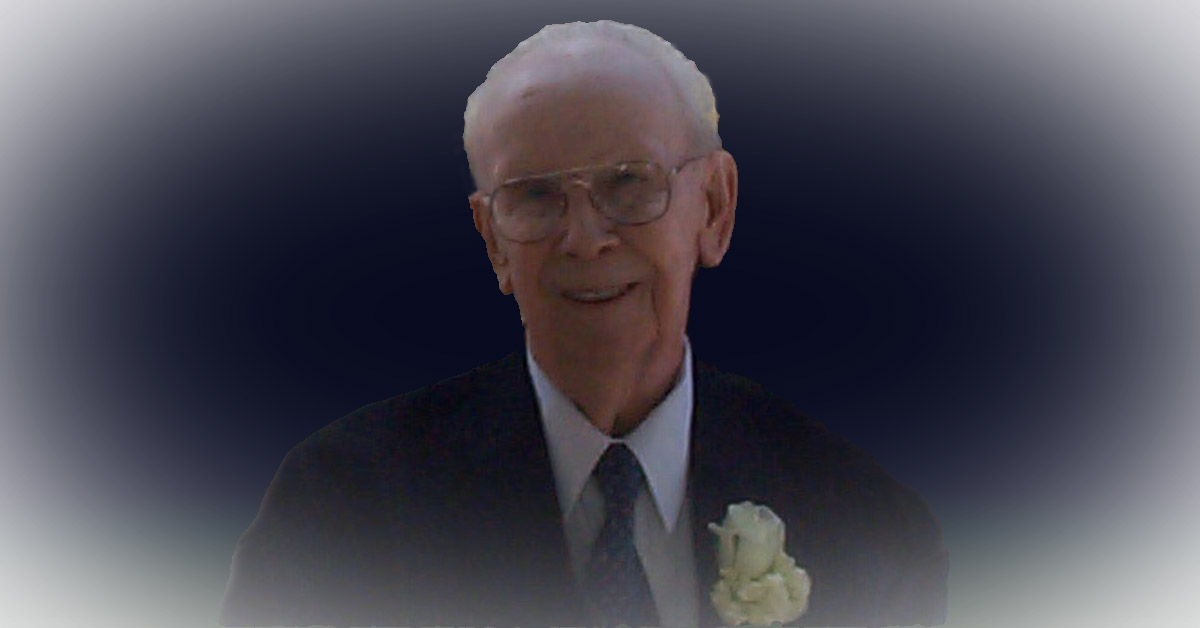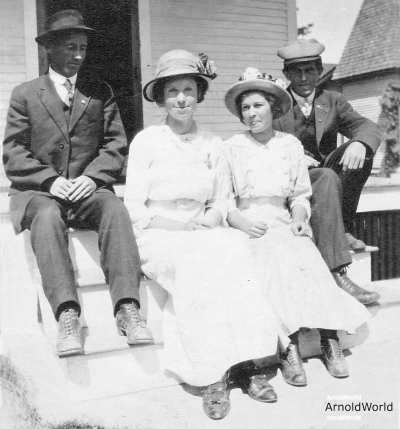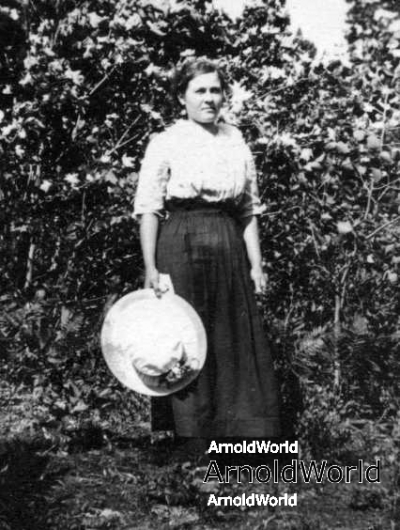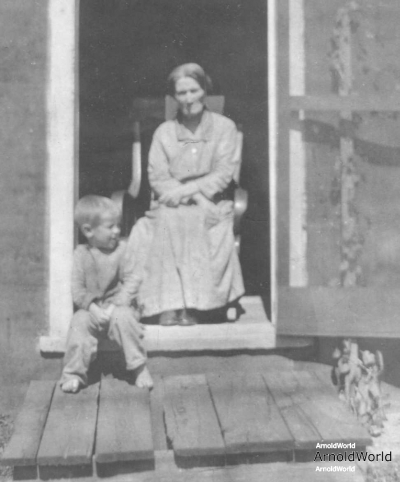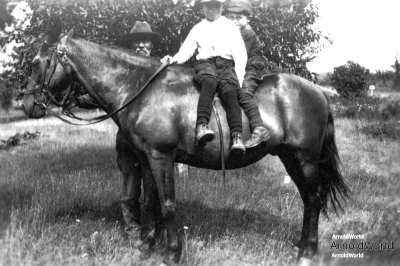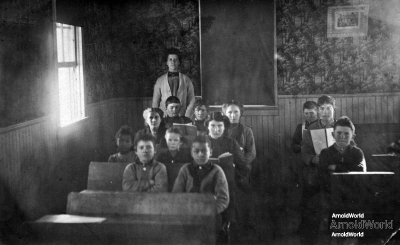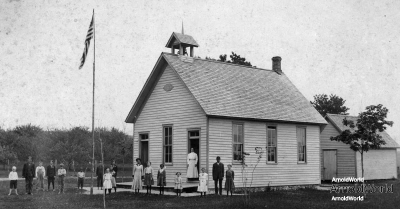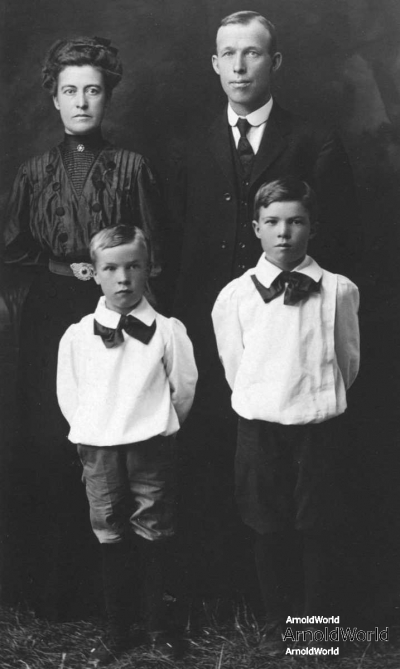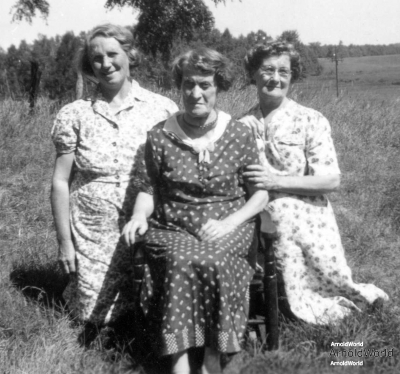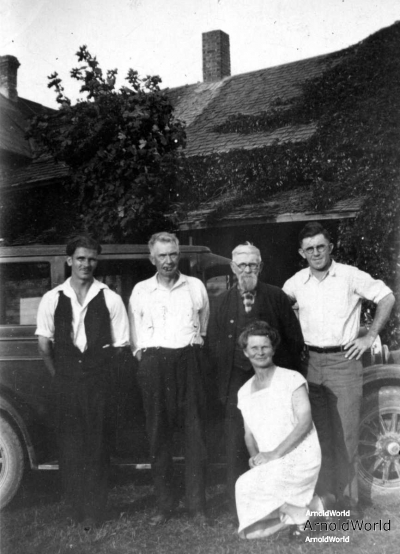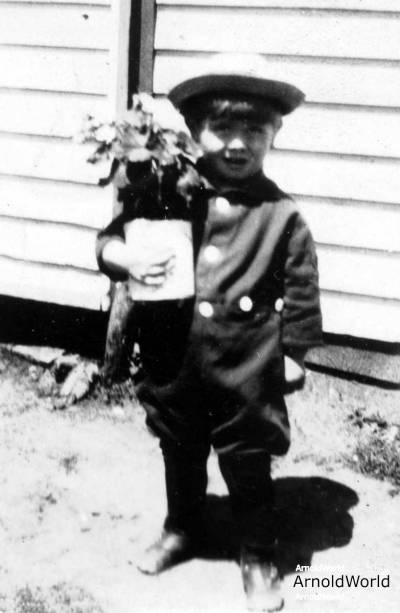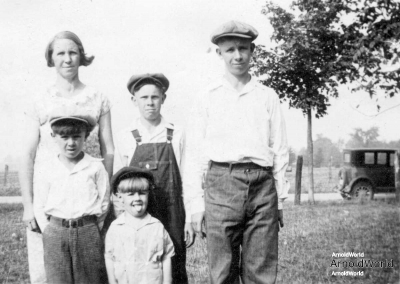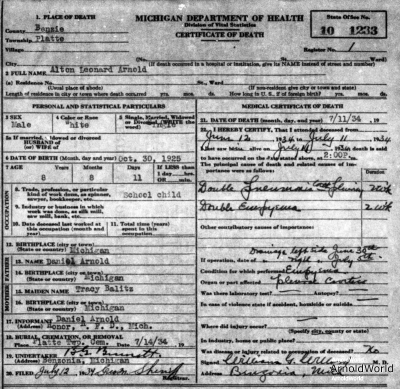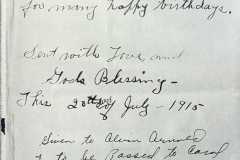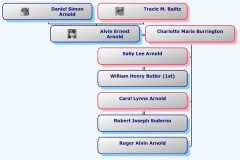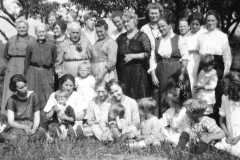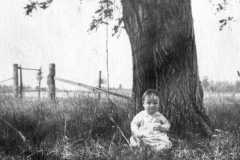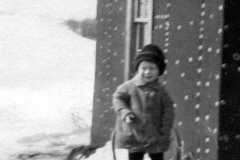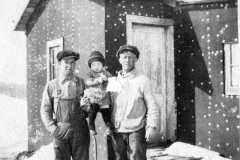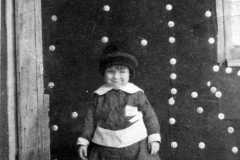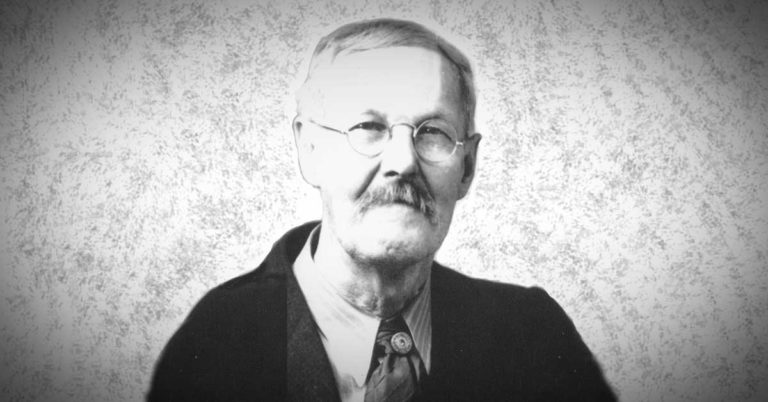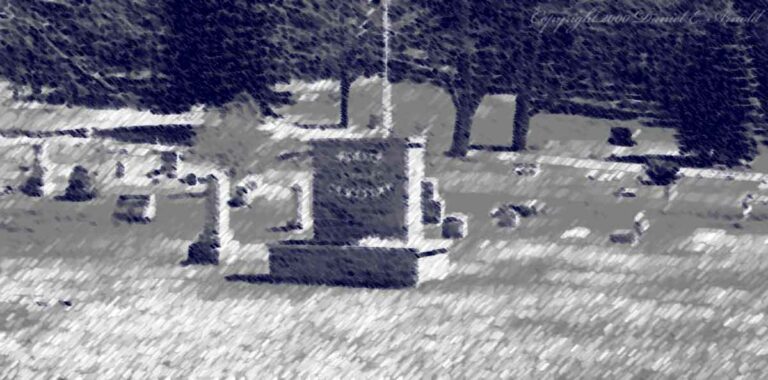We are very fortunate to have much of the story of Alvin’s life preserved for us in his own words. We present his memoirs in six segments:
- Youth and School Years
- Early Employment, Courtship, & Marriage
- War Declared
- Serving Overseas
- Back Home
- California
Part 1 of 6 . . .
Before Me
My mom and dad eloped to get married. My mom’s parents had someone picked out for mom but she wanted no part of it. My mom’s parents didn’t like or care for my dad and I don’t know all the reasons why. Some time in July however my mom and dad got together, eloped to Beulah (county seat) and were married by a justice of the peace. The transportation was by horse and buggy, a distance of about 15 miles. They stayed overnight before coming home to announce their marriage.
First Memories
My first memory of anything was at the house where I was born. It was not much of a house, as I believe my father and his parents constructed it for my parents to live in after they were married. I recall a sand bank close to the house and remember playing in the sand. I don’t remember this, but my mother said as a toddler I would follow my dad around in the freshly plowed furrow he had made with the horse and plow.
Lumber and Fruit
At this time the forests in Michigan were being harvested for their lumber and my father worked in the cutting of the trees. There were no chain saws in those days and it was a lot of hard work. I remember in winter time, how my father spent the week in lumber camp and he would come home late Saturday, and on Sunday afternoon he would put on his snow shoes and go back to the lumber camp.
At this time there were many farmers planting fruit trees – mainly cherry and apple trees. In the summer my father worked for some of these farmers. His father was a township road commissioner and he may have done some work for him also.
Spanish Flu
1917-1918 was one of the worst flu seasons ever. My mother tells of almost dying. My Aunt Lottie (father’s sister) died November 5th 1918. I always told my folks I could remember her, but now I don’t think so because I would only have been a little over one year old.
Grandma Hannah and Grandpa Dan
I remember my grandfather and grandmother (on dad’s side) quite well. About 1920 their house burned to the ground and a few days later my dad’s mother (Hannah Pettis Arnold) had a stroke.
I remember her sitting in a rocking chair and she was able to slide herself across the wood floor. The rockers were worn so there was a flat area that prevented rocking. She was very frail. I realize now that my grandfather had a tremendous task at hand, since she lived until January 22, 1925.
Grandfather lived alone for a while. We lived about a block away on the same 40-acre farmland. I remember going to see him often; he liked us kids. I say kids because my brother Allen came along in July of 1921. Grandfather had a pony that he gave us rides on and he always had a some kind of coin for us.
Living in a very rural area, I was not exposed to other children until Allen came along – there were no cousins close by.
One-Room Schoolhouse
I believe I started school at six years old and our one-room, one teacher school house probably had a maximum of twenty children through eight grades. The teachers (ladies) had to teach, be janitor, musician, stoke the fire and carry a big stick.
There was one boy about 18 years of age that lived some 3 miles away – a farmer boarded him for the work he could get out of him and he was very lonely. Every night when school was almost out, he would grab someone by the wrist and start to take them home with him. I think they were always boys and I was one of them. He was much larger and very strong. When he would get hold of me I’d go along like I was willing and I would wait for him to relax his grip; then I’d wrench myself loose and run as fast as I could. He was clumsy and couldn’t run very fast so it wasn’t too big of a problem.
Fruit, No Lumber
It was about this time that the lumber industry was winding down since most of the valuable trees had already been cut down and made into lumber.
My dad then went to work for the fruit farmers and we moved to one of their farms. Three brothers had come from California to Illinois and purchased this farm. Their names were Caviggiola, Pellezari, and Autinini. They had ten children between them so that helped our small school to have someone to play with. My dad became the working foreman at that time and spent many years there.
In a short time only Caviggiola was left. I think the others were too used to the city life and didn’t like digging around in the dirt! That left six children.
Old #2
Sometime in 1924 or 1925 we moved to what we call #2. It was a nice farmhouse and it was on one of the three farms owned by Caviggiola’s. This was our home until about 1934-1935. My dad was still the boss of the orchards. Dad raised his own pork and beef and we had our own chicken, garden, etc. on the side. I had the task of getting up around 4:30 am to help milk the three or four cows and separate the milk in a hand crank separator – extracting the cream which we could sell or make butter out of it to use or sell.
Electricity wasn’t brought into the area until about 1938-1939 so especially in the wintertime we had to do all our outside chores by lantern light, which gave a little more light than a candle. It was a kerosene lantern. In the house we also had a couple of kerosene lamps. I know the meaning of “burning the midnight oil”.
Aunt Lillie and Uncle Joe
While living on #2, my Aunt Lillie and Uncle Joe Harwood lived almost across the road from us. Aunt Lillie was my dad’s sister. She became an invalid after bearing two sons – Ralph and Willard. She developed heart trouble and had a goiter. She was a lovely person and I spent quite a lot of time there. She always had a cookie or piece of hard candy to share for watering her plants or doing other little chores. She was confined to a cot and bed. They didn’t have fancy wheelchairs back then. She preached to Allen and me later about being good and about the Bible. Allen was my brother, born July 21, 1921.
My Uncle Joe had about a 50-acre farm and he tried to farm and be a full-time caregiver. Their son Ralph had a good job in Chicago with the telephone company and at least part of the time, he was able to get a lady to come and help for board and room. Uncle Joe was a good, kind man and I think he wore himself out before his time. He had an awful burden. He died several years before Aunt Lillian.
Aunt Daisy
There was also Aunt Daisy (Krause), my dad’s sister. As long as I knew her, she lived in Iron Mountain in the Upper Peninsula of Michigan. Almost every year she would come to visit, and she’d stay mainly with Aunt Lillie. To me it was rather exciting, since we didn’t have many visitors from far away like across Lake Michigan. My Aunt Lillie loved her sister, but didn’t really approve of the fact that she and her husband ran a beer tavern and catered to the miners in that area – copper, iron, etc. Aunt Daisy was a lot of fun and everyone loved her company. We were sorry to see her leave for the trip home.
Uncle Leo
On my mother’s side was Uncle Leo, her brother. Leo had polio at an early age and one leg was much shorter than the other, but he got around pretty well and didn’t seem to let it bother him much. He and my mother were close and he came to our house to eat quite often. He and my dad were also good buddies. Uncle Leo had a knack for fixing cars and he could fix most radios, as the first crude sets were coming out about that time. My dad got a used one and he would hook up the car battery to run it a couple times a week. I liked Uncle Leo. He died in the early 1930’s from a broken appendix. My grandmother tells of him lying on the floor in pain and begging for a gun to shoot himself. He died shortly after that. There were no ambulances or paramedics at that time out in the farm area.
Uncle Ernie
My other uncle, Ernest Balitz, had grown up and moved to the city before I could remember much about him. He did come to visit his parents quite often so I would see him then. He had a pretty good job in Toledo, Ohio. As I said before, he didn’t like my dad marrying his sister. However, they did reconcile in later years and became quite close. Uncle Ernest always drove a Packard. That was a great classy car.
My first job for money was picking cherries. My mother would take Allen and me to the orchards and we would pick cherries by the pound. I had to apply what I made to buying clothes for school. This lasted for about two weeks during the heat of the summer.
Alton Arrives
Alton was born October 30, 1925. In those days, siblings were not made aware of a new brother or sister coming. You just woke up one morning and you had a new brother delivered at home. I think my Grandmother Balitz probably delivered us all before the doctor arrived. I would have been about eight so I didn’t remember too much about him as a baby.
Grandpa Departs
My grandfather [Daniel Webster] Arnold died in 1928. It was a great loss to me. I loved him.
School Life
My years in the grade school in Platte #2 were pretty routine. From #2 I had about three quarters of a mile to go to school – good weather and bad. I don’t think one can now imagine all eight grades in one building in one room! I remember some of the larger kids gave the lady teacher a pretty hard time. (Boys, of course.)
We had limited sports at school – a baseball bat that someone had crudely made out of a stick, but it was better than nothing. The ball we had probably wasn’t much better than a beanbag. In the winter there were some hills in the area so we could ski and sled down the hills. We did manage to have sleds.
My youngest brother, Laban, was born during this time – October 10, 1929.
At that time, I was entering into the last three years of grade school. We brothers got along fairly well. My mom and dad would go into town for food some times and leave me to watch Allen and the others, but the minute they were out the door Allen would challenge me and say he didn’t have to mind me. It usually ended in a fight, but not too serious.
By today’s standard our schools were pretty far behind the times with a very limited library and reference material. A little later, when I entered high school, I believe we were about a half year behind the Honor School. So there was some catching up to do. “Number Two” brings back a lot of memories. When Willard Harwood was home, he would quite often take us kids to the lake for swimming, which we loved. He was good with kids. Also, a lot of times on Sunday he would get his folks and mine together and make a freezer of ice cream in a crank style freezer. My mother tried different mixtures like adding maple syrup, etc., and we never had a bad batch. Everyone ate it and liked it except my Grandpa Balitz. I guess it did not mix too well with his tobacco chewing.
I graduated from eighth grade in 1932 from my one room schoolhouse. There was one more year of this Platte school and from then on all grades were sent to the Honor school system.
High School
So now I would be starting high school. That would mean a class of about 20, compared to one grade in Platte being 3 or 4 kids. Then there were all new friends to make and it was rather hard because we were about a half-year behind. Honor High School was about eight miles away and we had to walk (three of us) three miles to catch a bus to take us the rest of the way to school. It was rough in the winter because we had some severe storms. The bus was old (pre 1930) and there was very little heat in it. That was for the first year. The next year they bought all new busses, which were quite nice. Several times we would have to all get out of the bus and help push it through the snow or icy road in sometimes subzero weather.
The first year of high school went fine after I caught up a little from being behind from the Platte school. The teachers worked with us, since I was not alone. I was not able to participate in any extracurricular activities because the bus did not stay after school at all. In fact, I walked home a couple of times because I didn’t catch the bus. I don’t remember for what reason. It wasn’t because I had to stay after school; the teachers couldn’t do that with bus kids. I did join the FFA (Future Farmers of America). That probably turned out to be a blessing for me as well, as we’ll find out a little later.
After finishing my freshman year, it was back to fruit picking for the summer and helping with the gardening. I also helped my Grandfather Balitz some with hay harvesting. Then I started tenth grade and the new busses came right by my door. It was okay on the bus, as there always seemed to be some excitement. Sometimes, I even did a little homework if it was not too noisy.
Pneumonia – Close Call
As I recall it was a severe winter and sometime in March or early April of 1934, I contracted pleural pneumonia and nearly lost my life. The great efforts of my mother and Grandmother Balitz were all that saved me. In the early stages, they used poultices of cooked oatmeal and/or onions. I was in and out of consciousness and in severe pain with pleurisy. Then, my folks called in a doctor and I believe he didn’t have much more to offer than aspirin. I was flat on my back and very weak. Finally, this doctor called in another doctor (surgeon) and they decided they would have to drain fluid from my right lung. Dr. Covey was from Honor and the surgeon, a Dr. Thatcher or Thacker as I remember was from Frankfort. So they met at our house one morning to proceed with the operation. My mother and grandmother held my hands and my dad held my feet, while the doctors made a slit between a couple of ribs and inserted drainage tubes to leave in place for a few days. This was done without the benefit of painkillers. I screamed but they didn’t stop. It hurt awfully, especially going into an infected area. They drained a lot of fluid and bandaged it to catch the fluid as it drained. The pain of the pleurisy remained but I did start to eat and gain a little strength back. My grandmother, who lived about a half mile away, was at my side for a long time as my mother did the other work. Slowly, I was nursed back to health.
Gone too Soon
Then, sometime in June, brother Alton also got pneumonia similar to what I had. They did the poultice thing with him also, but didn’t operate to insert drainage tubes. He went through quite a long sick period and seemed to be improving. I remember the morning he woke up out of a semi coma; he said, “I’m hungry and want something to eat”. My mom fixed him something to eat and he ate a bit of food. Alton then lay back in bed and died. My dad was working in the field close by and they told me to get him, because my mother almost went out of control. I remember her taking it awfully hard. Only at this time could I know the feeling. Alton was just under eight years old. It was July 11, 1934 that he died. Fortunately, Allen and Laban escaped getting serious ill with this pneumonia.
Recovery and Reset
It was now coming into the cherry picking time and I still was very weak and not able to do much so my mother elected to let me stay home and take care of Laban and help prepare the meals while she went out to work in the orchards so I got a little experience washing dishes and a little cooking with my mother’s expertise. As I remember, Laban didn’t give me any trouble and Allen went with my mother to pick cherries. Allen was a champion cherry picker from an early age.
The summer wore on and my thoughts began to wear on my mind about the school year coming on. I was even thinking about not going back. It seemed impossible to lose almost three months and go back in the same grade. My dad had helped me plant a little patch of popcorn for my FFA project and just before school was to start the school superintendent came out to inspect my project. I wasn’t very proud of it, as it had been a real dry season. It really didn’t matter and I was rather disappointed, but Mr. Rochester (superintendent) talked to me for a long time and was determined that I was coming back to school. He said if I wanted to come in the same class, they would help me catch up, but I chose another option. I decided to work in the apple harvest as long as it lasted, then drop in the same grade again. Yes, I had a feeling as to what the class would think but I felt that was the best thing to do. No one ever said it was the wrong thing to do. So I graduated a year late and that was when I felt the worst, when I saw my original classmates graduate ahead of me. I owe a lot to Mr. Rochester. I had one more year of high school. During the summer I picked cherries, etc., and Aunt Lillie’s son Ralph Harwood, who was working in Chicago at the time, sent twenty dollars to have me cultivate their corn, so I followed a horse cultivating corn for two weeks (no riding). That was about the going wage at that time.
Although I liked school and had some good buddies, it seems that the last year of high school dragged on. Finally, I graduated in 1937 and I was to face a lot of new challenges.
Continued . . .
Return to Alvin’s main biography page, go directly to the next memoirs segment, or choose from the following:
- Youth and School Years
- Early Employment, Courtship, & Marriage
- War Declared
- Serving Overseas
- Back Home
- California
